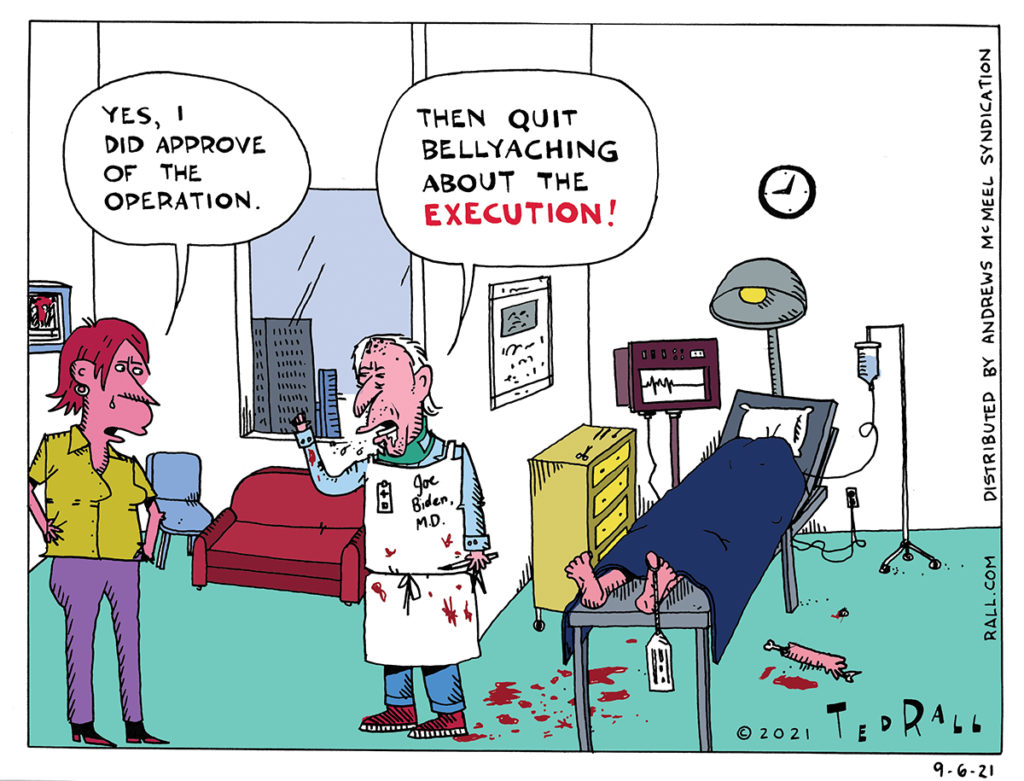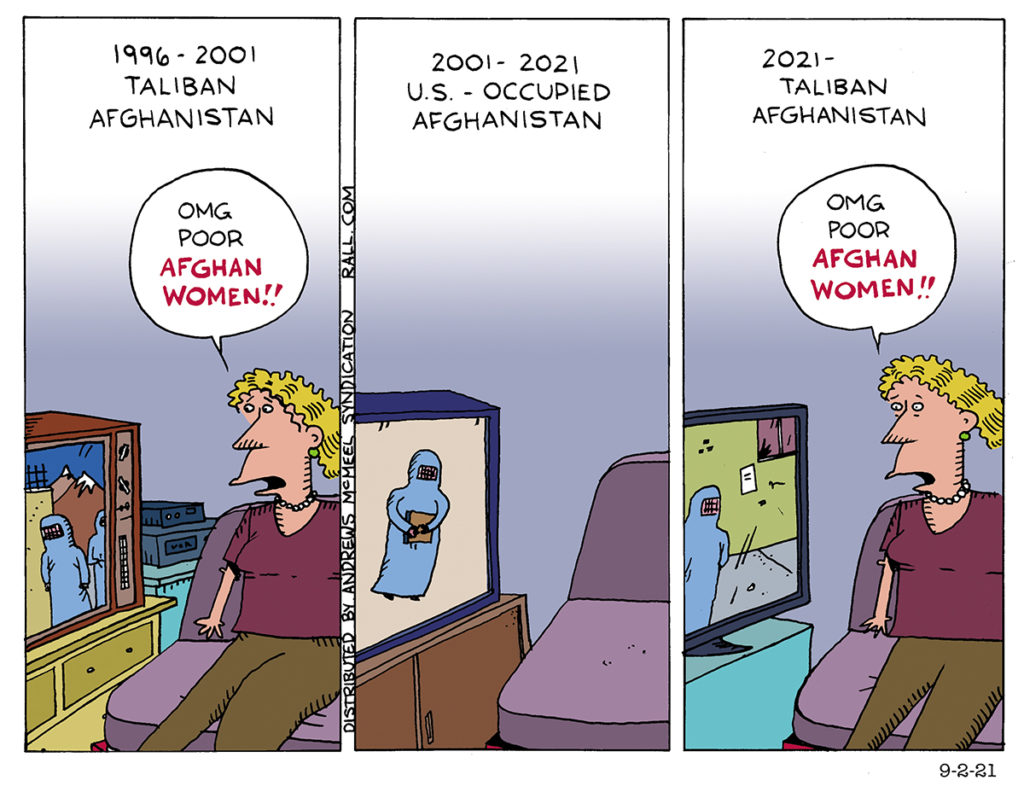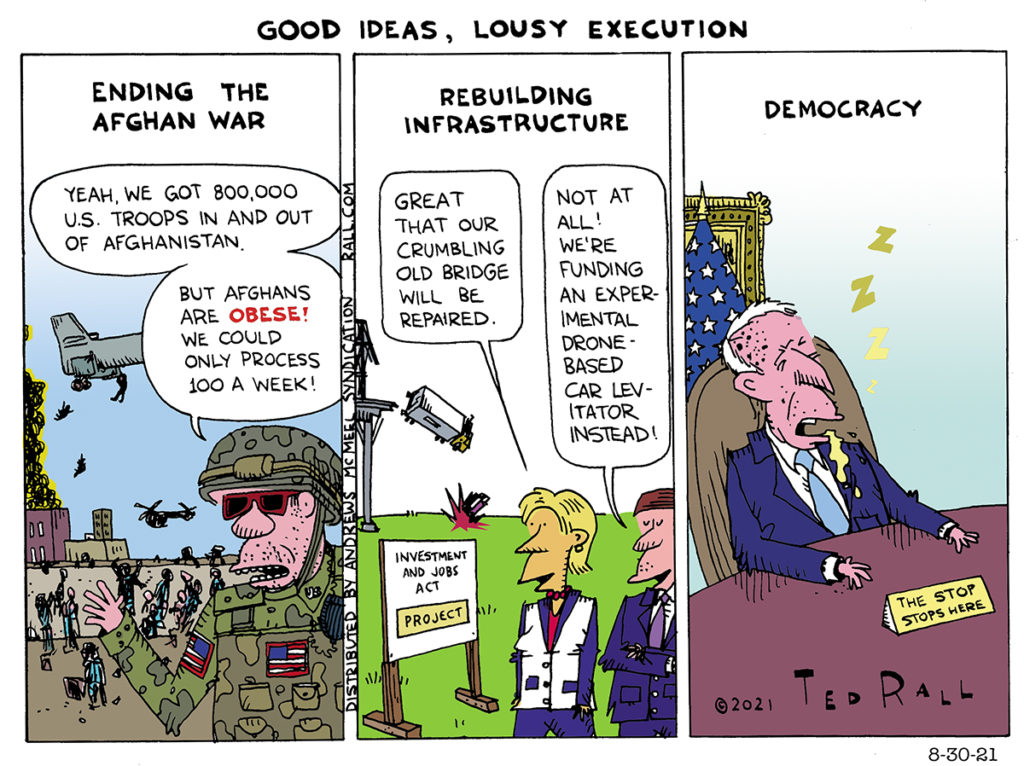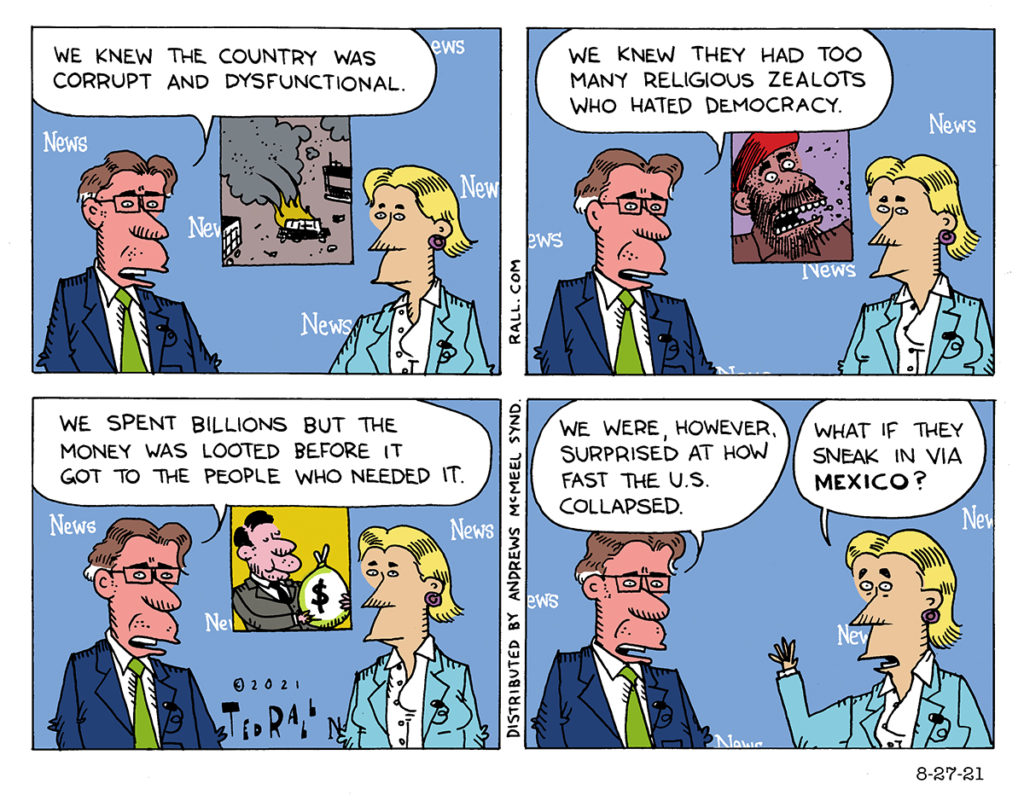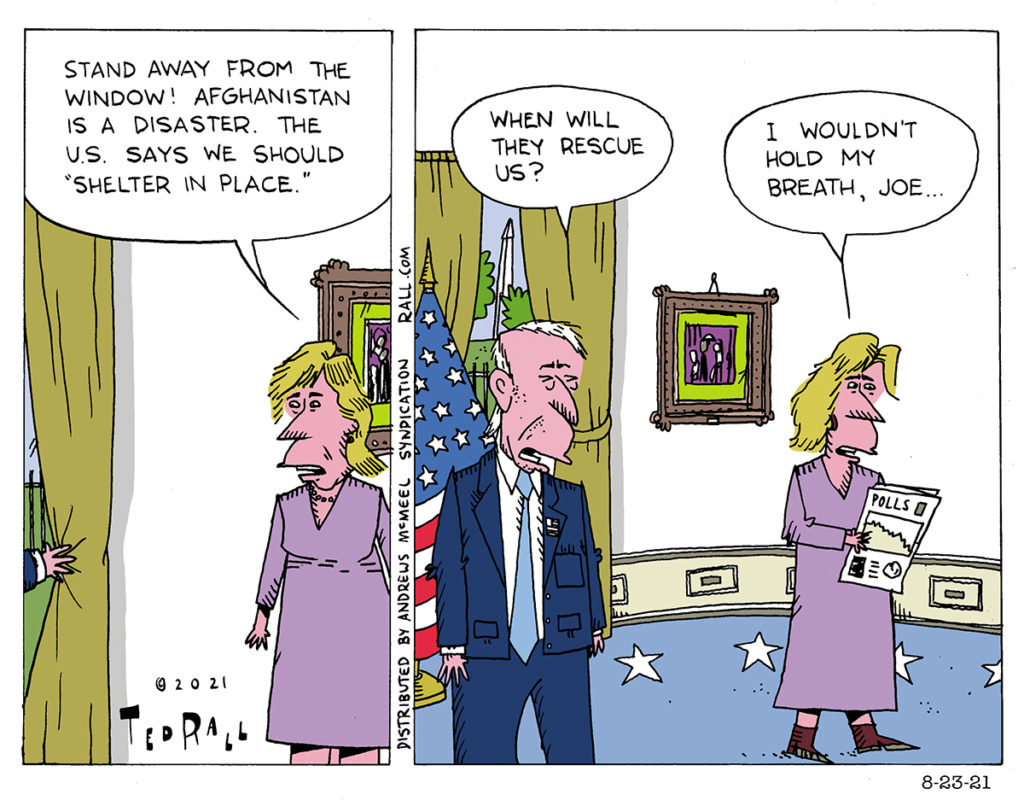Joe Biden and his defenders say a messy evacuation from Afghanistan was inevitable, though if that’s true, why didn’t they plan accordingly? Now they argue that criticism of the execution of the withdrawal is tantamount to remaining indefinitely.
The Collapse of the U.S. Government

Taxes are the price we pay for government. But a government that doesn’t provide basic bureaucratic services is no government at all—and it doesn’t deserve our tax dollars.
Afghan translators, and others who worked for the U.S. military and American journalists and NGOs, aren’t Americans and don’t pay taxes. But the U.S. government’s failure to process their applications for Special Immigrant Visas in a timely manner highlights the breathtaking scale of dysfunction, or non-function—to which too many Americans have become accustomed.
When the Biden Administration took over in January, it inherited a backlog of 18,000 SIV applications filed by Afghans who wanted to leave before the scheduled U.S. pullout on September 11. Biden’s folks managed to process 100 a week, before stopping entirely because of a spike in Covid cases in Afghanistan (though no one has explained what the novel coronavirus has to do with immigration given the existence of vaccines and quarantines). Even if they hadn’t quit, at that rate the State Department would only have processed 3,200 applications by 9/11/21, leaving almost 15,000 Afghans out of luck. And that’s not counting the additional 70,000 applications that came in after January.
We discovered water on Mars. We beat Nazi Germany. The IRS processes 240 million returns a year, many of them complicated. If we left the Afghans hanging as the Taliban closed in, it’s because we—well, Biden and his administration—wanted to.
The president’s eviction relief package is another example of bureaucratic no-can-do.
Anyone could see the right way to pay off back rent for Americans who lost their jobs through no fault of their own but rather because they or their employers complied with the government’s orders to stay home and away from work: administer the program federally under HUD, keep paperwork simple, set up a fully-staffed 1-800 number to help distressed tenants, and wire money directly to landlords so the dough doesn’t get diverted to other bills. These days, however, the last thing anyone, including the government, wants to do is to hire full-time employees—an attitude that is, of course, a big part of the joblessness problem. So Congress outsourced Biden’s $46.5 billion federal rental aid program to the states. Because the feds didn’t offer to compensate them for the extra work, many states didn’t bother. As a result, only about 10% of the rental assistance funds have been disbursed. Now the Supreme Court has stopped the CDC’s eviction moratorium—and Americans who should have received help will lose their homes.
Even the IRS, an organization whose mandate is to extract cash from companies and individuals, has collapsed. Millions of people are waiting for refunds because the agency has a backlog of 35 million unprocessed returns, a fourfold increase over a year before.
Government doesn’t work. Contact a Congressman or Senator via their official website and you may not even receive an automated acknowledgment, much less actually hear back about your concern.
Call a government office—local, state, federal—and, if they’re not closed for some obscure holiday, you’ll wind up on permahold. Or they’ll hang up on you after ages on permahold.
Americans are self-reliant. If you want something done, do it yourself. I’m fine with that.
What I’m totally not fine with is paying good money for a service I don’t get. That’s a ripoff. If you advertise that you perform a service and I pay for that service, you had better give me what I paid for. To do otherwise is fraud.
Our government commits fraud every day.
Congressmen promise to serve their constituents. Their websites say they reply to queries. If they don’t, why are we paying their salaries?
I don’t want to hear excuses about being short-staffed. Early American politicians like Thomas Jefferson set aside hours a day to reply to letters from citizens. “From sun-rise to one or two o’clock,” our third president noted, “I am drudging at the writing table.”
You know neither Ted Cruz nor AOC spends 15 minutes a day doing that. It’s a bigger country now, but computers and freelancers easily make up for the higher volume of correspondence.
About Afghanistan again, what’s the value of American citizenship if your passport doesn’t get you out of a war zone? Many Americans were stuck in Kabul, unable to get to the airport due to large unruly crowds and Taliban checkpoints. Yet the military refused to leave the airport to escort them from their places of shelter. Only when news accounts emerged about other countries like France and the United Kingdom, real countries with actual governments that work sometimes, sending their troops into the streets to rescue their nationals, did the U.S. order a few desultory forays into Kabul which, by the way, the Taliban had no objection to.
Oh, and State Department officials: there is no excuse for leaving the U.S. embassy in Kabul, the biggest consular operation in the world, empty. The Taliban didn’t ask us to do so; to the contrary, they’re guarding the compound in the hope that we’ll return. Abandoning that facility is a cowardly abdication of our duty to U.S. nationals and allied Afghans who need diplomatic assistance and representation. It is absurd that, if I return to Afghanistan, there will be no U.S. presence in a country that actually wants it. There’s danger—but many career diplomatic corps types would gladly accept the risk. I’m not a tax resister, but why am I paying taxes?
For Christ’s sake, hire some staff!
Ronald Reagan campaigned on the joke that some of the scariest words in the English language are, “I’m from that government and I’m here to help.” That joke would fall flat now. No one from the government promises anything; assuming they exist in the first place, they don’t even bother to return your phone call.
(Ted Rall (Twitter: @tedrall), the political cartoonist, columnist and graphic novelist, is the author of a new graphic novel about a journalist gone bad, “The Stringer.” Now available to order. You can support Ted’s hard-hitting political cartoons and columns and see his work first by sponsoring his work on Patreon.)
DMZ America Podcast #6: Alzheimer’s, Afghanistan and Biden
Scott Stantis and I are aghast at the obvious failing cognitive abilities of America’s chief executive and Commander-In-Chief as he fends off media queries about American incompetence in the face of the takeover of Afghanistan by the Taliban. What can or, more to the point, should be done about our befuddled commander-in-chief? Riffing off personal experience, Scott and I have a few ideas on this latest edition of the DMZ America Podcast. Please listen and share!
What Will the Taliban Do? It’s Up to Us.

How will the Taliban govern Afghanistan? It may be up to us.
The U.S. is out, but what the Biden Administration and its Western allies do in the weeks and months ahead will have a big influence on whether the Central Asian country reverts to the insular medieval barbarism of the 1990s or modernizes in order to conform to major international norms.
The Taliban is far from monolithic. They have common values: adherence to sharia law, resistance to foreign interference, the traditional Pashtun tribal code of pashtunwali. How those general values manifest as specific policies and laws will be subject to interpretation through the movement’s fluid internal politics.
Divided along regional and tribal lines, an alliance between anti-imperialist Afghan nationalists motivated to protect the country’s sovereignty and Islamic fundamentalists, and partly composed of former Ghani regime soldiers and policemen who defected under pressure, the Taliban is a highly decentralized movement whose desperate leadership could tilt it toward the hardliners, or more liberal and modern thinkers.
Right now, the Taliban are saying the right things and sending positive signals about keeping girls’ schools open, allowing women to work, and amnesty for Afghans who worked for NATO occupation force. Clearly the order has gone out from the Taliban shura to their fighters to behave correctly. Images from a Taliban press conference reveal that the presidential palace has not been vandalized or looted. In a signal that this is not your father’s Taliban, high-ranking Taliban official Mawlawi Abdulhaq Hemad sat for an interview with a female television journalist whose face was uncovered. Former president Hamid Karzai is safe despite having remained in Kabul. While Western news media made much of the Taliban firing their guns outside the airport, firing over people’s heads was clearly an attempt at crowd control.
Americans would not have voted for the Taliban to govern Afghanistan. But we don’t get a vote. For the foreseeable future, what seemed inevitable to anyone who was paying attention over the last 20 years is now a fait accompli. The question now is: which Taliban will we and, far more importantly, the people of Afghanistan be dealing with?
The Taliban who are allowing French, British and other nations’ troops to travel inside the capital in order to escort their citizens to the airport for evacuation—who even risked their own lives to evacuate Indian embassy staff—and who have left unmolested old Afghan government posters of ousted president Ashraf Ghani and iconic Northern Alliance commander Ahmad Shah Massoud, a sworn enemy of the Taliban assassinated by Al Qaeda?
Or the thugs who tortured and assassinated nine members of the Hazara minority and have threatened to subject women to forced marriage?
The U.S. and its Western allies face a choice. We can exert pressure through de facto economic sanctions, as the Biden Administration has done by freezing the Afghan government’s $9 billion in assets and cutting off half a billion in IMF funding, and via airstrikes, another option the president is keeping on the table. Alternatively, we can offer economic aid and diplomatic recognition. Or we can tailor a middle path that ties rewards to our perception of the new government’s behavior.
Pouring on the pressure would be a tragic mistake. It will strengthen the hand of the most radical Taliban hardliners at the expense of relative moderates who want Afghanistan to look and feel more like Pakistan: undeniably Islamic in character but connected by trade and communications to the outside world. You don’t want your adversary to feel as though it has nothing left to lose—so give them something they want to keep.
Let’s be mindful of how the blunders of American policymakers in response to the 1979 Islamic revolution in Iran needlessly radicalized a revolutionary government.
Had President Jimmy Carter not admitted the deposed Shah to the U.S. for medical treatment, radical college students would not have seized the U.S. embassy in Tehran or taken 52 staffers as hostages. Supreme Leader and Ayatollah Ruhollah Khomeini, by temperament a moderate who opposed hotheaded tactics, was forced to side with the student radicals during the hostage crisis or risk being pushed aside by his own uprising. After the embassy was taken over, there was too much national pride at stake for either party to back down. The U.S. and the new Iranian government dug in their heels, leading to decades of misunderstanding and antagonism.
While a total absence of pressure would be politically unpalatable and unrealistic given the Taliban’s 1990s track record, U.S. policymakers should deploy a light touch with Taliban-governed Afghanistan. Playing the tough guy will strengthen the hand of hardliners who don’t want girls to be educated or women to fully participate in society, and prefer to return to the bad old days of stonings and demolishing cultural treasures. Right now, the relatively liberal wing of the Taliban is in charge. Let’s try to keep it that way.
(Ted Rall (Twitter: @tedrall), the political cartoonist, columnist and graphic novelist, is the author of a new graphic novel about a journalist gone bad, “The Stringer.” Now available to order. You can support Ted’s hard-hitting political cartoons and columns and see his work first by sponsoring his work on Patreon.)
New podcast! Please listen and share
Just dropped the brand-new edition of the DMZ podcast with Scott Stantis and I.
Today we are talking about the collapse of Afghanistan, and how it affects the Biden Administration as the President’s poll numbers continue to slide into the toilet. What’s the outlook for the midterm elections and the next presidential cycle? I continue to talk about my own experiences traveling in Afghanistan and Scott makes a strong case for voting third party.

